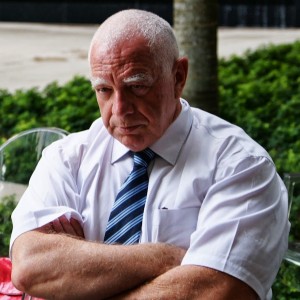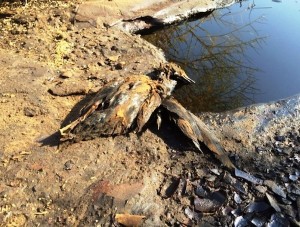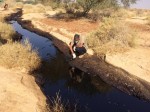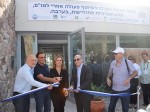The Tran-Israel oil pipeline spill near the Evrona Nature Reserve in the Arava Desert has harmed flora and fauna. (photo by Menachem Zalutzki via Israel Ministry of Environmental Protection)

Dr. Yoel Sasson, a professor at Hebrew University’s Casali Institute of Applied Chemistry, specializes in environmental catalysis, and he and student Dr. Uri Stoin have developed a soil decontamination process that can treat waste caused by any organic compound, including oil.
According to Sasson, spills are common in countries where oil is being moved by pipes and, considering how old the pipe is in Israel, it was just a matter of time that such a leak would occur, he said.
Exacerbating the situation was that it took hours for the break to even be detected. “It’s horrible, because the oil is simply killing everything,” said Sasson. “All the farmland, the flora and fauna … nothing is left alive once the oil is there.”
The Ministry of the Environment is now in charge of cleaning up the spill and they will have to select the contractor to do the job. According to Sasson, there are several companies that have placed bids, one of which is Man Oil Group, the Swiss company licensed to commercialize this technology developed at HU.
A superoxide, the technology is a variation of an oxygen molecule. “Unlike the oxygen molecule, which is relatively inert, superoxide is a very aggressive, free agent,” explained Sasson. “And it actually oxidizes every organic material.”
It works by breaking down the organic (carbon-based) matter into water and CO2, and the organic material very rapidly oxidizes, he explained. “Normally, within 10 minutes, oil simply disappears … the soil re-mineralizes,” he said.
“As the oil is killing everything, when you apply the agent, you do not revive the plants, but you take the soil back to its virgin condition. And then, with time, nature will come back. We estimate six to 12 months, [then] it comes 100 percent back to life.”
The CO2 released in the process can also be neutralized and turned into sodium carbonate, which is soluble with water. With rain, it will be washed away.
Typically, technologies of this kind are termed as either “biological” or “chemical.”
Biological means bacteria is applied (i.e. eating or digesting the oil), a technique that has been used for many years. While this does work, it has some drawbacks. “It’s very slow,” said Sasson. “It would take a half a year to a year to start to see something developing. And it requires excavating the soil, digging it out, so the bacteria will have some air. They are aerobic material.
“Our method is chemical,” he continued, “which means it’s fast, a matter of minutes, actually.”
Sasson estimated that the oil did not seep deeply into the Arava soil, approximately 10 or 20 centimetres maximum. Regardless, he said, the agent is not limited to any particular depth. It can be drilled into the soil and the whole treatment can take place underground.

Man Oil Group has been cleaning up oil spills with superoxide in Siberia, Africa and in the Gulf States, and is now looking at the soil in the Arava. The areas that it cleaned in Siberia were larger than that of the Arava spill, and the company has also conducted a successful test cleaning a stretch of a Swiss railway track. The track base, which is comprised of limestone, was restored to its white state, eliminating years of oil drips that were becoming an environmental problem, killing everything around it. Man Oil also conducted a test on the Arava spill site, with positive results.
According to Sasson, oil-caused damage is a worldwide problem that is very serious. But he is focused on cleaning up other contaminated areas as well, one of which is the result of military industries that have left organic pollution underground in Jerusalem.
“This particular case involves mainly those from a group of materials called ‘organic chlorine compounds,’” said Sasson. “These types of compounds, nature doesn’t recognize, and they are polluting underground water. It’s really a disaster.
“When we started, we worked on the destruction of these materials. This was very successful. But, we noticed it takes a lot of time with the authorities to get permission. It takes many years to start such a cleanup. Meanwhile, the oil cleanup is faster and is needed in many more places.”
Another application focus for Sasson is sewage sludge, a by-product of bacteria used to digest sewage waste being disposed of into the environment, causing contamination.
“You feed bacteria your waste,” said Sasson. “They convert the waste into CO2 and water again but, at the same time, they are growing. And, normally, for one kilogram of waste, you will build up a weight of about 450 grams of bacteria (about 50 percent) and then you create a new waste. So, instead of having one kilogram of waste, now you have half a kilogram. But you’re still stuck with it, because there’s nothing to do with the bacteria. So, what we are trying to do is really decompose this waste using our agent. So far, initial experiments show it is working but, of course, we have to substantiate it and develop it into larger scale.”
At press time, Sasson was still waiting to hear from the Ministry of the Environment if the process they developed will be chosen to clean up the Arava spill.
***
The Evrona Nature Reserve rehabilitation team began its work on Jan. 12, 2015, with a meeting headed by Deputy Environmental Protection Minister Ofir Akunis. Air quality tests found that there has been a 90 percent reduction of pollution in Evrona, one of the sites most harmed by the December 2014 oil spill in Israel’s southern Arava region. Some 30 companies are now vying to be selected to decontaminate the soil that was contaminated by the oil spill. The reserve, noted Akunis, will open once there is no fear that the health of visitors could be affected. The hope is that this will be in the near future.
– Israel Ministry of Environmental Protection (sviva.gov.il)


